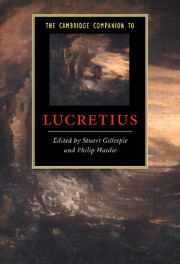Book contents
- Frontmatter
- Introduction
- Part I: Antiquity
- Part II: Themes
- Part III: Reception
- 12 Lucretius in the Middle Ages and early Renaissance: transmission and scholarship
- 13 Lucretius in the Italian Renaissance
- 14 Lucretius in early modern France
- 15 Lucretius in the English Renaissance
- 16 The English voices of Lucretius from Lucy Hutchinson to John Mason Good
- 17 Lucretius in the European Enlightenment
- 18 Lucretius in Romantic and Victorian Britain
- 19 Lucretius and the moderns
- Dateline
- List of works cited
- Index of Main Lucretian Passages Discussed
- General Index
17 - Lucretius in the European Enlightenment
from Part III: - Reception
Published online by Cambridge University Press: 28 May 2010
- Frontmatter
- Introduction
- Part I: Antiquity
- Part II: Themes
- Part III: Reception
- 12 Lucretius in the Middle Ages and early Renaissance: transmission and scholarship
- 13 Lucretius in the Italian Renaissance
- 14 Lucretius in early modern France
- 15 Lucretius in the English Renaissance
- 16 The English voices of Lucretius from Lucy Hutchinson to John Mason Good
- 17 Lucretius in the European Enlightenment
- 18 Lucretius in Romantic and Victorian Britain
- 19 Lucretius and the moderns
- Dateline
- List of works cited
- Index of Main Lucretian Passages Discussed
- General Index
Summary
To characterise Lucretius’ impact on the age of the Enlightenment is a daunting task. Virtually every major figure of the period was in some way influenced by Lucretius, and many of these engagements represent a complex, often polemically charged dialogue with previous interpretations. However, it is possible to make out three relatively cohesive strands, which might be termed the ameliorist, the radical and the aesthetic.
In the first phase, the Newtonians and deists both English and French (such as Locke, Shaftesbury and Voltaire) seek to reconcile the secular authority of science with the concept of providence. Second comes the inevitable consequence of the tension between these two mutually antagonistic worldviews, for, once science had succeeded in accounting for the order of creation, God, as Laplace remarked to Napoleon, increasingly became an unnecessary hypothesis. Among those who helped to render that hypothesis superfluous, Bayle, Diderot and Hume represent the Lucretian critique of deist arguments from design, while Mandeville and Rousseau illustrate the use of the DRN for purposes of a more general social critique. The third strand can be seen as an attempt to negotiate the antagonism between Enlightenment progress and religious value. The focus here will fall chiefly on Kant, but the wider picture includes the work of Burke, Schiller, Rousseau and Goethe.
- Type
- Chapter
- Information
- The Cambridge Companion to Lucretius , pp. 274 - 288Publisher: Cambridge University PressPrint publication year: 2007
- 5
- Cited by

